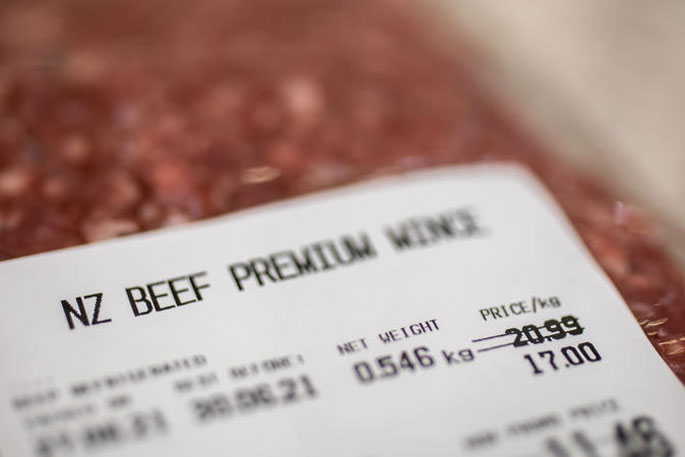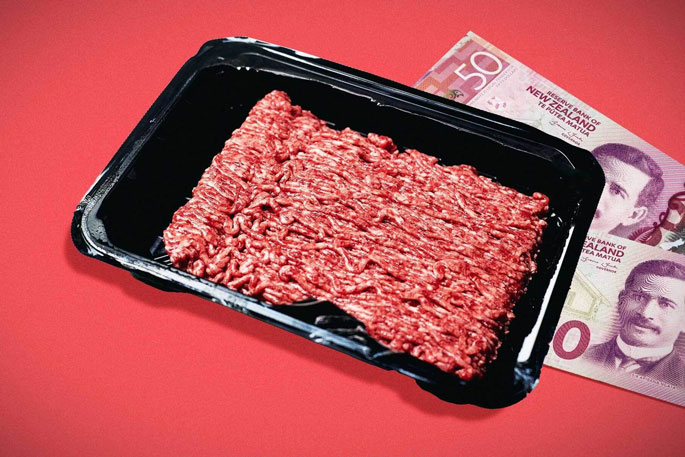If you feel like red meat is more expensive than it used to be, you're right.
Around 95 per cent of New Zealand's sheep meat and 87 per cent of beef is exported, and what's left behind for locals is being sold at a premium.
In January 2007, 1kg of beef mince would have cost $9 according to Stats NZ's food price index. If you put a pack in your shopping trolly in January this year, it would have cost $16.39.
That's an 82 per cent increase and inflation doesn't explain the difference.
Had the price of beef mince simply risen with inflation, that $16.39 pack of mince would have cost just $12.09.
Stewing beef, such as blade steak, shows a similar pattern.
In 2007, a kilogram cost $11.90. In January this year the same amount cost just over $20. Had it matched inflation, it would have cost $15.98.
It's a similar story with lamb. A kilogram of lamb chops cost $10.51 in 2007. Now it's $18.02. Had it matched inflation, it would be $14.11.
Beef + Lamb NZ chief executive Rod Slater says the cost of meat in New Zealand reflects what markets overseas are willing to pay.
"If a housewife in the middle of Oxford in the UK is prepared to pay a certain price for a cut of meat, we have to match that in New Zealand," he says.
"We are price takers, not price makers in this country."
Slater has heard New Zealand consumers complain about the price of meat for years.
"It's nothing new. Consumers always have - and maybe justifiably - have tended to think that we're paying too much for our product and some of them go to the UK and they see lamb being on special in the supermarket at less than what they can buy it."
One of the emerging buyers for our red meat is China.
African swine fever decimated the country's pig numbers in 2018 and former trade negotiator and founder of consultancy Sanders Unsworth Charles Finny says this is why China has been importing more beef and lamb.
Finny says there were previously misconceptions about what goods would sell well there.
"I can remember exporters saying to me, 'Oh, well, China is never going to be a big dairy market because people don't really like milk products, and they don't like lamb either'."
Now it's the top buyer of New Zealand's dairy and sheep and, in 2019, it was the top buyer of beef before slipping back to second place behind the United States.
He put the increased demand down to the growing wealth of China's citizens.
Parents with increased earnings wanted the best nutrition possible for their child, making New Zealand's dairy products, with their reputation for high food safety standards, popular.
NZ China Council's executive director Rachel Maidment says the Chinese government has also sent strong messages about nutrition.
"There's been a big focus in China on nutrition and high-quality protein and the impact that that can have on building immunity. So over the Covid period, there's been quite a government focus on high-quality food to build immunity."
 Photo: RNZ / Claire Eastham-Farrelly.
Photo: RNZ / Claire Eastham-Farrelly.
While New Zealanders may pay more because of the demand for our food from other countries, there is a flipside to global competition.
Sometimes other countries produce food cheaper than New Zealand does and there's nothing stopping New Zealanders choosing a cheaper, imported option.
Pork prices, for example, have risen at lower rates than inflation.
In January 2007, a kilogram of pork loin chops cost $14.25. Now it costs just 26c more. Had it followed inflation the cost would be $19.14.
It's thanks to imports. Around 60 per cent of the pork consumed in New Zealand is imported. In 2020 almost 30 per cent of imports came from Spain, and 25 per cent came from Canada.
"Imported pork is often cheaper than New Zealand pork because many overseas countries pay subsidies to their farmers, which reduces the costs of farming. Overseas, pig feed inputs are also cheaper," says NZ Pork chief executive David Baines.
Animal welfare standards, however, are lower in the majority of countries pork is imported from, and some countries allow growth promotants to be used.
The New Zealand industry pushed for country of origin labelling to make it clear to consumers where pork and pork products come from.
While New Zealand imports pork for consumption here, it also exports it. In 2020, 93,000 tonnes were exported. In 2019 over 350,000 tonnes was sent offshore.



5 comments
Smoke and mirrors
Posted on 20-07-2021 10:35 | By Slim Shady
Why is Mr Beef and Lamb NZ blaming it on the “housewife in Oxford, UK”? First, that’s very misogynistic. Second, it’s much cheaper there. You can get cheap mince for $6 per kilo. Even the primo stuff is much less than the equivalent here. Like everything else. Kiwis are getting ripped off.
Here’s An Idea
Posted on 20-07-2021 12:18 | By Bob Landy
Instead of spending money to shut down Kiwi farmers the government should be subsidising Kiwi farmers to supply reasonably priced Kiwi food to Kiwi households.
Absolutely Appalling
Posted on 21-07-2021 16:07 | By Yadick
This is absolutely disgusting that old Mrs brown in the UK can dictate to NZ - a meat producing nation, the exorbitant prices we pay to compensate their good price of our prime cuts leaving us raggerty bits of low end, sub standard crap. The only thing premium about our meat is the price we pay. I've given up on the shreds of un-uniform, expensive offal like meat from our supermarkets. I deal only now with the family butcher shop at the Mount or Kiwi Fresh Meats in Greerton. They're both value for money and quality. At least they take pride in their products. Time to sort things out Jacinda. You're supposed to be leading our country not smiling and nodding at everything.
Red Yadick
Posted on 22-07-2021 09:11 | By Slim Shady
Hahaha. Capitalism is awful isn’t it Yadick? Much better to have State controlled farming and no imports or exports. Close the border and be self sustaining insular little hermits. Until you end up like North Korea with not enough food or medicines or all the other things that is traded in the market place called the World. Come out of the panic room.
Smoke
Posted on 22-07-2021 09:32 | By Slim Shady
Any idiot knows that commodities that are traded have prices set by the world market. Blaming the “UK housewife” is both sexist and racist but you’d expect nothing less from Mr NZ Beef and Lamb. Of course the real reason for the rise in global prices is the fact that overreacting left wing Governments around the globe have decided to “keep us safe” by slowly choking the world economy to death in order for them to achieve their political aims.
Leave a Comment
You must be logged in to make a comment.